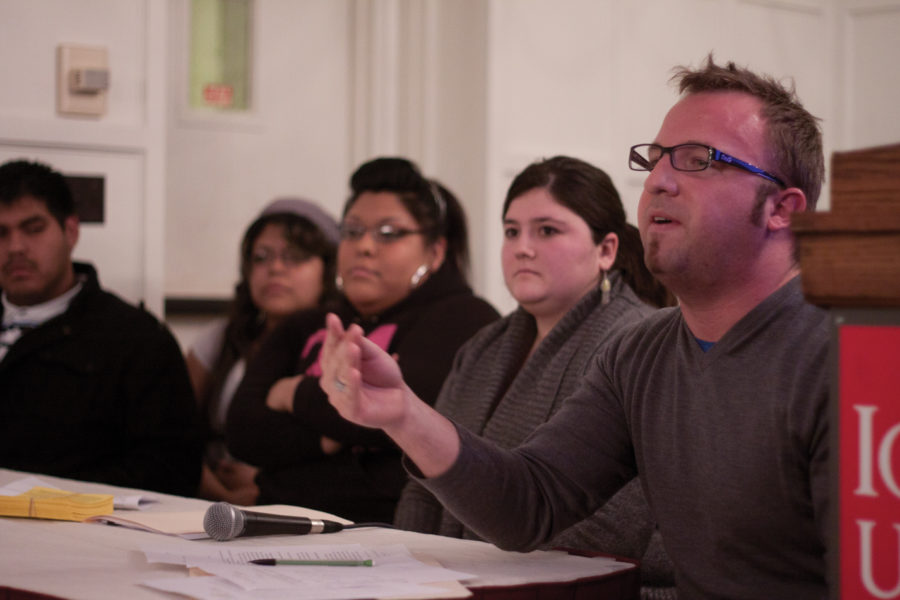Panel discussion focuses on hardships of undocumented immigrants
Photo: Huiling Wu/Iowa State Daily
Ryan E. Gildersleeve, assistant professor of educational leadership and policy studies, speaks during the Dare to Dream event Thursday in the Memorial Union.
February 3, 2011
With a diverse crowd before them, Cynthia Salas and Roberto Orozco were pleased as they recognized that the issue they were opening for discussion wasn’t affecting Latinos alone.
The Cardinal Room in the Memorial Union was filled with students ready to watch the film “Papers: Stories of Undocumented Youth” and listen to panelists speak about the issue of undocumented students. Though this is an event put on by Latinoamericanos, LAMDAS and the Interested Gentlemen of Lamda Theta Phi, many different ethnicities were represented in the crowd.
“It’s an issue that affects students across the board, not just Latinos,” said Salas, senior in liberal studies and president of Lambda Theta Nu.
One focus of the event was the Development, Relief and Education for Alien Minors Act, which is a piece of legislation that would allow undocumented students to join the military or go to college, leading them to a path of citizenship. First proposed in 2001, the DREAM Act remains unpassed now, a decade later.
When asked how many people knew about the DREAM Act, many in the crowd raised their hand. When asked how many knew the requirements of the DREAM Act, fewer hands remained in the air.
Both Salas and Orozco, junior in marketing, felt that the forum gave students an opportunity to learn the facts of the Iowa Opportunities Work Force Act and the DREAM Act without misleading propaganda, allowing them to make unbiased decisions.
“Students need to be aware of these issues because it comes down to our votes to pass or not pass the laws,” Salas said.
“[Watching Papers is] a better way to grab the attention of people because students can say whatever they want,” Orozco said.
This allows viewers to fully hear the stories of the students without allowing any interruptions.
“It’s incredibly relevant to the state of Iowa given the demographic changes,” said Ryan E. Gildersleeve, assistant professor of Educational Leadership and Policy Studies and panel speaker.
During the past two decades Iowa’s Latino population has quadrupled. If the laws change in any way it would affect a large portion of the population in Iowa.
Panel members Diego, Marie and Carina Alvarez, of Marshalltown, are brothers and sisters who shared their stories and struggles as undocumented citizens with the audience.
Marie was brought to tears as she shared the story of her family dealing with the issues of being undocumented and attempting to live in the country and attend college. Having been told repeatedly that they’re not able to pursue their dreams because legislation like the DREAM Act has not passed, the family is now speaking out.
Diego received a letter stating he can now apply for his visa; however, this requires him to return to Mexico and appear before a judge, separating him from the rest of his family.
“It is hard to watch my brother struggle just because of an eight digit number,” Carina said, referring to his lack of a Social Security number.
As they told their story, it was evident they were upset and frustrated with their situation and the issues being dealt with. Despite this, none of them have given up hope.
“We’re not promoting illegal immigration,” Diego said. “The DREAM Act requires people to be here for a certain amount of time since a certain time period [before it grants citizenship].”
“Not everyone is going to be granted citizenship,” Maria said. “They’re going to give it to people that have been here and working hard.”
The Iowa Act is a piece of state legislation that would help in-state undocumented students with their financial issues. This would currently do little good, since they cannot attend colleges without the documentation that the DREAM Act would provide.
“Both the DREAM Act and the Iowa Act need to go hand in hand,” said Ruth Schultz, panelist and community organizer with Iowa Citizens for Community Improvement.
Currently the outlook of passing the Iowa Act in the Iowa House of Representatives is dim, Schultz said.
The movie “Papers: Stories of Undocumented Youth” showed that many of the undocumented youth have excelled in their communities as they feel it is their own. These students did not choose to come into America illegally and feel a strong connection to the U.S., a place they call their home.
Many arguments that non-supporters have given were brought up on the panel, one of them being the issue of citizens paying for public benefits for illegal aliens.
“[Citizens] pay for public benefits all the time,” Gildersleeve said.
The night’s discussion helped raise awareness on the issues that undocumented citizens face and prompted many to ask for ways that they can also help raise awareness.

















